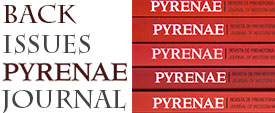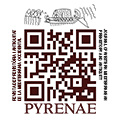Publication ethics ![]()
Pyrenae is a journal which follows a process of anonymous peer reviewing in order to guarantee both the quality and the scientific originality of its contents. In this process all those engaged in the collection of the contents, production and editing of the journal – editors, readers-peer reviewers and authors – must follow a series of norms of ethical conduct according to international standards and based on the principles of originality (non-plagiarism), objectivity, impartiality, honesty and anonymity. In this way the necessary high scientific quality of the articles can be achieved.
The Editorial Team of Pyrenae, prior to the review process, will analyse the adequacy of the manuscript to the editorial policy, ethical codes and the absence of plagiarism (through the URKUND platform provided by RCUB/Scientific Journals of the UB).
The responsibilities of the editors ![]()
The editors of Pyrenae will carry out the process of the collection and subsequent editing of articles submitted with maximum confidentiality and respect, both during their evaluation and publication.
* Guarantee that there is no conflict of interest and the confidentiality of articles submitted. Neither the manuscripts nor any part of their contents may be shared with anyone who is not author or peer reviewer-reader.
* The evaluation process. The editors, once the manuscript has been received, will contact peer reviewers and begin the process of anonymous evaluation. If the evaluation results in disagreement, another reader will be contacted.
* Guarantee the confidentiality of the reviewers. The principal editor will not divulge the name or other details of the reviewers without their prior consent.
* The final decision regarding the acceptance of manuscripts. The reviewers’ reports on the submitted manuscripts will be sent to the editors of Pyrenae. The editors will make the final decision whether to publish an article and will send the reviewers’ comments to the author(s). The editors of the journal are informed about the readership target and distribution of the journal, as well as its scientific impact and needs.
The responsibilities of the reviewers ![]()
The scientific evaluation of an article is an altruistic process governed by established ethics. Every report must have a constructive and professional character. The report must take in consideration the originality and proper use of the data, as well as note any plagiarism. The peer reviewers of Pyrenae are chosen according to their scientific suitability and excellence in their field of research.
* Guarantee the confidentiality of manuscripts received. Neither the manuscripts nor any part of their contents may be shared with anyone without the express permission of the editors. The content may not be used or cited by the reviewer in his own work until the article is published.
* Provide an objective, constructive and professional report on the manuscript they have received.
* Evaluate the manuscript in the allotted time. If the reviewer is unable to complete the report in the allotted time the editors must be informed immediately and the reviewer must withdraw from the evaluation process.
* Declare any conflict of interest. The reviewer must inform the editor of any conflict of interest or of any work or personal relationship which could compromise the impartiality of their assessment.
* Notify the editor of any plagiarism in the revised manuscript.
The author's responsibilities ![]()
* Guarantee the originality of the manuscript. Authors must not present articles which they have previously published or which they are in a process revising for publication in other journals or monographs.
* Make explicit reference to sources they have used. If authors have used information taken from other sources (either published or ceded-transmitted to them by other researchers) this must be clearly cited. Any evidence of plagiarism, which may result in a penal infraction, will lead to the immediate rejection of the text for publication.
* Recognise all those who have contributed to the research. Any significant contribution by other researchers must be explicitly recognised by their inclusion as co-author(s). All those signing as authors must be aware of and approve the final version of the article once this is accepted for publication. Authors must indicate the sources of funding received for their research (cf. Submission Guidelines).
* Notify the editor of any conflict of interest which may affect the publication or acceptability of the manuscript.
* Authors should notify the journal editors of any errors in their published articles so that the appropriate corrections can be made.
* Authors must use inclusive and non-sexist language when writing the manuscript. Useful recommendations by the European Association of Science Editors.












